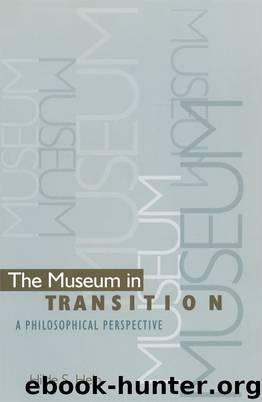The Museum in Transition by Hilde S. Hein

Author:Hilde S. Hein [Hein, Hilde S.]
Language: eng
Format: epub
ISBN: 978-1-58834-410-6
Publisher: Smithsonian
Published: 2014-07-15T04:00:00+00:00
Institutional Morality
Discussions of professional or institutional ethics often focus on the moral discontinuity between public and private life, as if the ultimate choice were between individual integrity and the conflicting demands of political or professional interest.43 In my estimation, the museum is a suprapersonal entity, subject to moral imperatives that are qualitatively distinct from those that apply to individuals. More like the theater than like a mausoleum or department store, the museum is bound by institutional performance standards that affirm moral responsibility for transforming people’s feelings and judgment.44
The committee that formulated the AAM’s 1992 Code of Ethics for Museums ascribed to the museum a capacity that “promote[s] higher and more consistent ethical standards that … serve[s] the interests of museums, their constituencies and society.” Evidently, however, it took these ends to be achievable by regulating the personal behavior of board members, employees, and volunteers. The ethics statement directs attention to the need to respect pluralism, the subordination of private interest to the public good, and collaborative behavior; but no appeal is made to a supervening normative character belonging to the museum as a whole that might assume leadership in guiding individuals toward realizing the “Good Society.”
As institutional mediators, museums are positioned to shape as well as preserve values, but narrowly focused moral codes lack the creative idealism to bring this about. A more inspirational source of moral leadership may be found in some controversial exhibitions and, especially, in the public discourse that accompanies their planning and execution. The excitement unintentionally evoked by the reaction to the National Air and Space Museum’s exhibition of the Enola Gay fuselage in 1995 reveals the moral potency that museums possess in principle, even where, as in this case, the museum yielded to restrictive pressure and backed away from its original exhibition proposal. Like the exhibition of Robert Mapplethorpe photographs at the Corcoran Gallery several years earlier, the NASM exhibition elicited public debate and perspicuous discussion of issues whose moral import could not have been deduced from universal principles or inferred from obligations prescribed to individuals.
If philosophers attribute moral character to institutions at all, it is only metaphorical. Even where personal behavior would be uninterpretable apart from the institutional framework that gives it meaning, the defining role of the institution is rarely noticed. Perhaps it is inconceivable to people that baseball, or the stock market, or the museum should originate value, because these institutions are commonly represented as abstractions—as conceptual composites of individual agents and administrative bodies. Notwithstanding their literal incorporation, their massive property holdings, and their political influence, institutions such as these are routinely denied a life of their own.45 This limited view of institutions, the one apparently assumed by the 1992 Code of Ethics for Museums, precludes the possibility that an institution could (or should) have an independent moral outlook or any character to speak of—good, bad, or indifferent.
The suggestion that institutions might originate and express moral agency appears to personify and invest them with suprahuman consciousness. We tend to believe that because morality entails intentionality, it therefore requires consciousness.
Download
This site does not store any files on its server. We only index and link to content provided by other sites. Please contact the content providers to delete copyright contents if any and email us, we'll remove relevant links or contents immediately.
| Anthropology | Archaeology |
| Philosophy | Politics & Government |
| Social Sciences | Sociology |
| Women's Studies |
Cecilia; Or, Memoirs of an Heiress — Volume 1 by Fanny Burney(32538)
Cecilia; Or, Memoirs of an Heiress — Volume 2 by Fanny Burney(31935)
Cecilia; Or, Memoirs of an Heiress — Volume 3 by Fanny Burney(31925)
The Great Music City by Andrea Baker(31911)
We're Going to Need More Wine by Gabrielle Union(19032)
All the Missing Girls by Megan Miranda(15925)
Pimp by Iceberg Slim(14476)
Bombshells: Glamour Girls of a Lifetime by Sullivan Steve(14046)
For the Love of Europe by Rick Steves(13865)
Talking to Strangers by Malcolm Gladwell(13340)
Norse Mythology by Gaiman Neil(13332)
Fifty Shades Freed by E L James(13228)
Mindhunter: Inside the FBI's Elite Serial Crime Unit by John E. Douglas & Mark Olshaker(9313)
Crazy Rich Asians by Kevin Kwan(9271)
The Lost Art of Listening by Michael P. Nichols(7486)
Enlightenment Now: The Case for Reason, Science, Humanism, and Progress by Steven Pinker(7303)
The Four Agreements by Don Miguel Ruiz(6739)
Bad Blood by John Carreyrou(6609)
Weapons of Math Destruction by Cathy O'Neil(6260)
